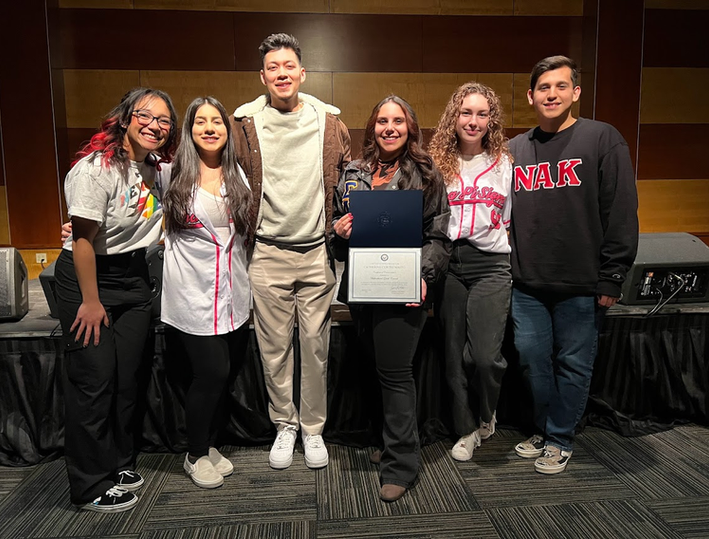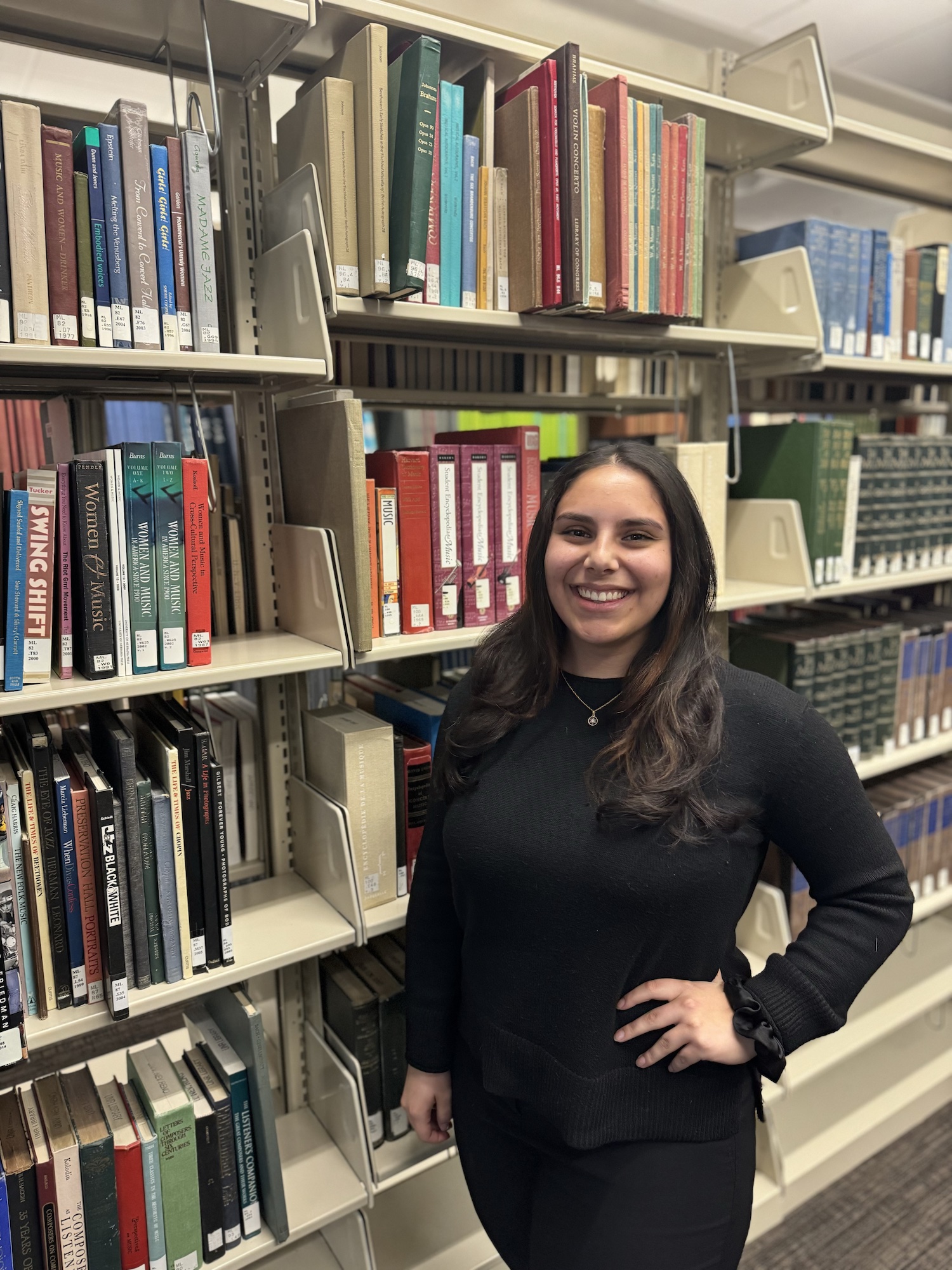Despite a unique cultural identity, Talia Guzman has always embraced what makes her different, especially as a University of Nevada, Reno (UNR) student, where she’s found herself grappling with finding her place and making her voice heard amongst her peers.
That is because Guzman finds she must balance her Latina and Jewish heritage, each with their own distinct set of beliefs and values. It’s been a challenge — however, it’s one she has willingly taken on.
Still, for Guzman, this is not a burden, but an opportunity to inspire other young girls and women to embrace their authentic selves, and share their unique identities. For this reason, the senior at UNR, spends many hours participating in diversity programming in and around campus, including appearing in a recent documentary about having multiple intersecting identities.
Mario Jimenez: Let’s get to know you a little better. What’s on your playlists? What songs do you listen to?
Talia Guzman: I like indie music right now. You may be familiar with the “Wallows.” They just dropped a new song and are coming to Vegas in August. I like this band called “Hers”. They’re not putting out any music [right now.] And Bad Bunny. What can I say?
I think people look at me and they know I’m not white. Right? I want to lean into that and share my Latina and Jewish experience. Being a Jewish Latina is very special to me.
Talia Guzman
Jimenez: How did your parents meet?
Guzman: It’s a silly story. My dad came here as a young adult to live with his older brother, who had little children. They were enrolled in a Head Start program, where my mom was the teacher. My dad went to pick up his nieces from school. He saw my mom and thought she was pretty, and he hit her with a bit of an eyebrow wiggle. She asked her coworkers, “Who is that dad? That [one who] is hitting on me. That man is here picking up his children. What is he doing?” They’re like, “No, those are his nieces. He’s their uncle, he’s single. He thinks you’re cute.” He was friends with one of her co-workers, and they had a going away party. The coworker invited my mom and dad, they met and hit it off. Then they started dating.
Jimenez: You had both a quinceanera and a bat mitzvah? Can you explain more about that?
Guzman: My beans and rice bat mitzvah! A bat mitzvah is a Jewish coming-of-age ceremony for girls aged 12 or 13, depending on what your community does. I had mine at age 13. It was the first time I read from the Torah, a sacred text, in front of my community. But because my dad’s family is Mexican Catholic, they were against it all [because the ceremony would make me Jewish, and not Catholic]. They hadn’t thought that wasn’t something that their son’s daughter was going to end up doing. So, and because I wanted to honor my grandparents and meet their expectations, I brought parts of the [quinceañera] celebration and blended it with the religious tradition of the Jewish side of my family. I had a vast poofy dress. I had braces so bad that it was ridiculous. Thirteen is such an awkward age. Fifteen is better, but 13 was when I had this.
Jimenez: Can you say you came of age twice?
Guzman: Well, I did not have a quinceanera, because quinceaneras are associated with Catholic culture, it’s a coming-of-age ceremony for girls, right? Historically, wealthy families would present their daughters, and when you came of age at your social debut, now you could get married. The court is like your friends or your cousins, who traditionally would have been eligible bachelors, so that girl could have ended up getting married. We’re not Catholic, so just not the religious part.
Jimenez: Do you think that your parents’ differences caused any controversy?
Guzman: When they first told their families who they were dating, everyone said, “Oh, what are you? What are you talking about?” Both of my mom’s parents are Ashkenazi Jews from the East Coast: my grandma, my mom’s mom, grew up in Richmond, Virginia. My mom’s dad is from Key West, an island off the coast of Florida, the southernmost point 90 miles from Cuba. So very different environments from Central Mexico, where my dad grew up. Luckily, there’s been no weirdness within the family. Both parties really like each other. They always ask about each other because my grandparents are on the East Coast, and my other grandparents are in Mexico, so they don’t see each other often. But every time we talk, they always ask about each other on the phone, wanting to make sure everybody’s doing well, sending well wishes. So that’s been nice. And it’s been fun to grow up with two different sets [of grandparents]. Being a third culture person and being able to blend everything is excellent.
Jimenez: Why did you participate in the People of the Pack (POP) CULTUR documentary?
Guzman: One of the team members asked me if they would share their initial survey with me. I was the multicultural Greek Council president. She asked if I’d share the information with people in that group. Then she said, “We’re filming a documentary. Would you be interested in sharing from the survey?” So I said “yes” to the little questionnaire, and then they said, “Oh, we’re ready. Come on, sit down, and start talking.”
Jimenez: What do these cultural identities mean by dictionary definitions?
Guzman: First, the dictionary is very flat, right? It’s super reductionist to be like the politically correct terms and everything. But for Ashkenazi Jews, it refers to a type of Judaism from people living in East Europe. Ashkenazi refers explicitly to Germany, but it’s also Lithuania, Poland, Belarus, Romania, Russia, and East Europe. Then there’s also Mizrahi Jews, who are from the Middle East, including Israel, like they stayed amd they never left Israel. They’re also Sephardic and Beta Israel Jews from India, Africa and Spain. So, my Judaism is like what you see here typically, like people with black coats, with the side curls, like that. Still, within that I’m a reformed Jew. So religiously, I have a more liberal mindset, one might say then regarding being Mexican, half indigenous, from Central Mexico, and then half Spaniard.
Jimenez: How do you define these cultures?
Guzman: I think, for me, it’s mostly about day-to-day, like a set of beliefs, like guidelines. Like, I wake up, this is what I’m going to do. This is how I’m going to navigate the world. So, for me, Judaism is religious and cultural. My Mexican identity is also based on culture, nationality, and ethnicity. Those are all slightly different.
Jimenez: Do you feel a sense of pride in being Latina? If not, what about your other identities?
Guzman: Yeah, a sense of pride and 100% for both. Many people feel like when it comes to statistics, I’m half this, half that. But how can you split that up? You’re 100% This and 100% that? I don’t have the privilege of passing, which is something else. I think people look at me and they know I’m not white. Right? I want to lean into that and share my Latina and Jewish experience. Being a Jewish Latina is very special to me.
Jimenez: How have Latina women in society influenced you?
Guzman: One of the ladies I thought was interesting in high school was Dolores Huerta. She’s with the farmworkers movement, like Cesar Chavez. She’s pretty cool. In high school, I was on an Alexandria Ocasio-Cortez kick. I liked her. As time has passed, we have some personal differences now. But I can’t point to a specific woman I hold up like an idol. I have yet to have the privilege of having too many female Latina mentors. My rabbi was a Cuban woman, like ethnically in quotation marks “Cuban.” She was someone that I looked up to as a professional and also as a Jewish woman of Latino descent.
Jimenez: What advice would you give the mayors of Reno and Sparks on engaging the Latino community in the area? And also the Jewish community?
Guzman: Several times, I’ve spoken with the Reno mayor. I have seen her out and about. She needs to pull her hiring from the communities she represents. As president and director of administration for the Greek Council, I know that we did have some people of Latino heritage come in and see what the Greek Council is all about. I like the community service that we do, and our involvement in the community. I think that stuff like that helps engage underserved or underrepresented populations. You know, the same with university officials, right? Just like teachers, it works better when you and the people in charge match the people they serve.

Jimenez: What do you hope for in the future for Latino students with multicultural identities?
Guzman: As the University continues to get more diverse, not just with more female students but also more female students of color or mixed-race students, I want them to all feel comfortable expressing all aspects of their identities here. When I first started, I felt a lot of pressure to pick one or the other, especially as I moved into different settings. In the space I present as Latina and the space I will show as Jewish, I’m both of those at all times. [I hope] for people to come to UNR in the future and be both things, or three, four, or five [things] at once. That will strengthen the campus, and people will have a better experience if they don’t feel they must hide parts of themselves. People want to be accepted for who they are and be able to contribute their specific perspectives, especially in an academic space. There’s so much value in being able to have conversations where people are bringing those different perspectives.
